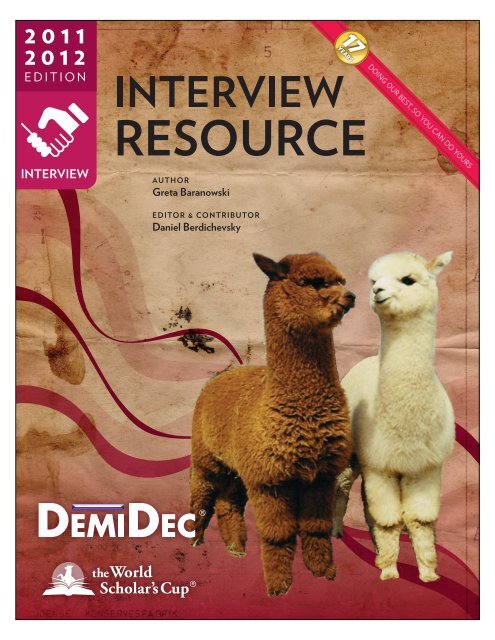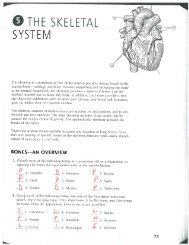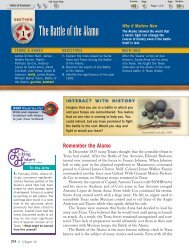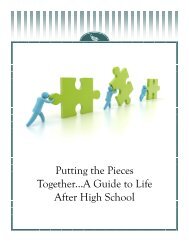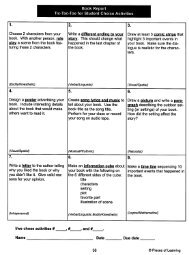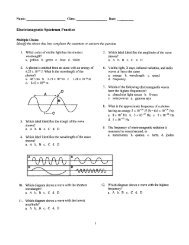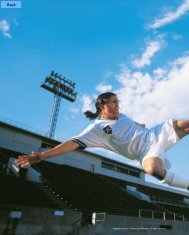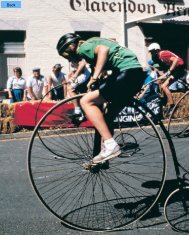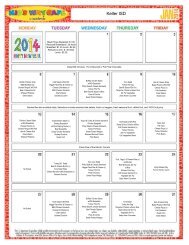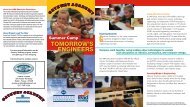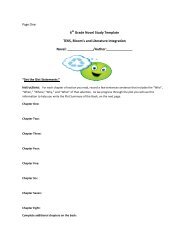Interview Resource - Keller ISD Schools
Interview Resource - Keller ISD Schools
Interview Resource - Keller ISD Schools
You also want an ePaper? Increase the reach of your titles
YUMPU automatically turns print PDFs into web optimized ePapers that Google loves.
2 0 1 1<br />
2 0 1 2<br />
E D I T I O N<br />
17 DOING OUR BEST, SO YOU CAN DO YOURS<br />
YEARS<br />
INTERVIEW<br />
AUTHOR<br />
Greta Baranowski<br />
EDITOR & CONTRIBUTOR<br />
Daniel Berdichevsky<br />
®<br />
the World<br />
Scholar’s Cup ®
INTERVIEW RESOURCE | 1<br />
<strong>Interview</strong> <strong>Resource</strong><br />
2011: The Age of Empire<br />
Table of Contents<br />
Preface: Meet the Judges .................................................................................................. 3<br />
The Rubric and Résumé .................................................................................................. 4<br />
The Résumé ....................................................................................................................................... 4<br />
Religion on the Résumé ................................................................................................................... 6<br />
Pare Down the Paragraphs ............................................................................................................... 6<br />
Dress, Appearance, and Demeanor .................................................................................. 7<br />
Dress and Appearance: To a T ............................................................................................................ 7<br />
The Handshake: Don’t Shake Them Up ............................................................................................ 8<br />
Say Cheese to Collect 100 Points ........................................................................................................ 9<br />
Posture: Straight as an Arrow ............................................................................................................ 10<br />
Don’t Gesture like a Jester ................................................................................................................ 10<br />
The Eight Basic Questions ............................................................................................. 12<br />
Responding to Questions ............................................................................................... 14<br />
Take Them by Surprise .................................................................................................................... 14<br />
Modesty............................................................................................................................................ 15<br />
Optimism ......................................................................................................................................... 16<br />
Be Heard .......................................................................................................................................... 16<br />
Ready, Set… ..................................................................................................................................... 17<br />
Talk With, Not At ............................................................................................................................ 17<br />
Judge the Judge ................................................................................................................................ 17<br />
Eye Meet You ................................................................................................................................... 18<br />
Probe-and-Hook is Not Hocus-Pocus .............................................................................................. 18<br />
Sentimentality .................................................................................................................................. 19<br />
Stay on Topic ................................................................................................................................... 19<br />
Make Perfect ..................................................................................................................................... 19<br />
Advice from Recent Decathletes ....................................................................................................... 20<br />
Making Things Up ........................................................................................................ 21<br />
Practice <strong>Interview</strong> Questions .......................................................................................... 22<br />
50 More Traditional <strong>Interview</strong> Questions ......................................................................................... 22<br />
Academic Decathlon: The Competition ........................................................................................ 22<br />
Academic Decathlon: The Preparation .......................................................................................... 22<br />
School and Extracurricular Activities ............................................................................................. 22<br />
Post-Secondary Education Plans .................................................................................................... 23<br />
Long-Term Goals .......................................................................................................................... 23
INTERVIEW RESOURCE | 2<br />
Values ............................................................................................................................................ 23<br />
Important Figures and Role Models .............................................................................................. 23<br />
Life Outside of School ................................................................................................................... 23<br />
Extras ............................................................................................................................................ 24<br />
50 Much Less Traditional <strong>Interview</strong> Questions ................................................................................ 24<br />
Controversial Issues ....................................................................................................................... 24<br />
Up Close and Personal ................................................................................................................... 24<br />
Thought-Provokers ........................................................................................................................ 24<br />
Random Challenges ....................................................................................................................... 25<br />
Memoirs of an <strong>Interview</strong> Judge ...................................................................................... 26<br />
Case 1 ............................................................................................................................................... 26<br />
Case 2 ............................................................................................................................................... 26<br />
The Upshot ...................................................................................................................................... 27<br />
About the Authors ......................................................................................................... 28<br />
by<br />
Greta Baranowski<br />
Arizona State University<br />
Mesa – Mountain View High School ‘04<br />
Daniel Berdichevsky<br />
Harvard University M.P.P.<br />
Stanford University B.A. & M.A.<br />
For Flint, who would have made a fine mascot—if he’d existed.<br />
DemiDec and Scholar’s Cup are registered trademarks of the DemiDec Corporation. Academic Decathlon and USAD are registered trademarks of the United States<br />
Academic Decathlon Association. DemiDec is not officially affiliated with the United States Academic Decathlon Association.
INTERVIEW RESOURCE | 3<br />
Preface: Meet the Judges<br />
The interview is like a first date. It’s all about making a good<br />
impression. 1 Listen carefully. Look confident. Be genuine. Don’t<br />
dominate the conversation—and, if you’re going after lunch, make sure<br />
you don’t have any food smeared on your face.<br />
Many teams prepare less for the interview than for any of the other events. What a lost opportunity! The<br />
interview is by far the most coachable event. Along with impromptu, it’s also one where a little practice<br />
makes a big difference. Sure, some Decathletes can succeed in the interview without practice—they’re<br />
naturals—but nearly all Decathletes can succeed with practice.<br />
Even someone with limited English or with a sparse resume can consistently score above 800 with<br />
enough practice (and feedback) under simulated competition conditions. Imagine if you spent as much<br />
time practicing for the interview as you do reading Super Quiz. That might be overkill, but try for at<br />
least thirty minutes a week—that’s four interviews and change. You should never tire of talking about<br />
yourself to anyone willing to listen.<br />
You’ll need to find suitable judges. The more often you can be interviewed by people who don’t know<br />
you, the better. Other teachers, your teammates’ parents, former Decathletes, members of the PTA, and<br />
local service club members are all great candidates. Even your coaches and teammates are much better<br />
than no interviewer at all.<br />
In this resource, you’ll find general interview<br />
tips, others specific to Decathlon, personal<br />
anecdotes, and a list of likely questions.<br />
Want the Cram Kit summary? Easy enough:<br />
be sincere and friendly, confident but not<br />
arrogant. The judges want to get to know<br />
you, not your idea of who you think they<br />
want to get to know. You may have to learn<br />
to come across as a happy version of yourself.<br />
Whenever you tire of practicing, remember<br />
that when asked what event has helped them<br />
the most in “real life” many Decathlon<br />
The event, it is a’changing<br />
For years, a benefit of the interview event has been<br />
that it prepares Decathletes for future college and job<br />
interviews. You learn how to prepare a resume and<br />
how to keep calm as you walk into a room for an<br />
unpredictable dialogue with three strangers. Over<br />
time, though, USAD has been making the event less<br />
like other interviews----removing résumés and, now,<br />
recommending all interviews be held simultaneously<br />
in the same large room. You should find out if your<br />
regional or state competition has implemented ‘‘arena<br />
interviews’’----and prepare accordingly. For example,<br />
you probably won’t want to project your voice in quite<br />
the same way if someone else is interviewing a few<br />
feet away on the other side of a cubicle divider.<br />
alumni choose this one. <strong>Interview</strong>s are unavoidable. They’re a vital part of applying to college, winning<br />
scholarships, getting a job, and running for public office. And they really are good practice for dating—<br />
especially for meeting a significant other’s parents. So listen to Greta for the next few pages, then go talk<br />
about yourself and make some new friends.<br />
Daniel Berdichevsky<br />
1<br />
For some less scrupulous decathletes, it’s about making up a good impression.
INTERVIEW RESOURCE | 4<br />
The Rubric and Résumé<br />
You wouldn’t study for math without checking the outline to see<br />
how many geometry questions there will be. In exactly the same way,<br />
for the interview you’ll want to look over the “rubric” used at most<br />
Decathlon competitions to determine your score.<br />
The interviewers will have these categories and percentages in mind when they assess you:<br />
CATEGORIES IMPORTANT ELEMENTS POINTS % OF TOTAL SCORE<br />
voice projection volume, directness, flexibility, appropriateness 10-150 15%<br />
non-verbal language movement, rapport, gesture, appearance, involvement 10-150 15%<br />
language usage grammar, enunciation, appropriateness 10-150 15%<br />
listening skills appropriateness of responses, attentiveness 10-150 15%<br />
answering skills skill in answering questions, clarity and completeness 10-200 20%<br />
overall effectiveness achievement of purpose, interest, reception 10-200 20%<br />
Note that how you answer matters as much if not more than what you actually say.<br />
The Résumé<br />
In many states, the interview now includes a résumé, either submitted before competition or handed to<br />
the judge when you arrive in your interview room. Some states still use so-called activity sheets (a sort of<br />
stripped-down résumé), but these work in basically the same way. However, more and more states are<br />
discontinuing the use of any résumés at all, making the event exclusively about generic questions. 2<br />
There are entire websites (and Idiot’s Guides) devoted to résumé-making, but here are a few starter tips.<br />
Make sure it is easy for judges to skim. Bold the words you want them to see.<br />
You want to put your name at the top. For a real résumé, you would add your address and number. 3 If<br />
you like, you can put some sort of general statement about your life goals—mine went a little like this: “I<br />
plan to attend Arizona State University, attain a master’s degree in English literature, and teach high<br />
school English.” It’s just a general statement of what I see myself doing in life, and it provides a nice<br />
segue into a conversation about my goals. Yes, it sort of gave away that I was from Arizona. But you<br />
never know: I might have been from a nearby state, or a New Yorker starved for sunlight and bikinis.<br />
After that, you want to have a few categories of things you’ve done. Some standard ones are Activities,<br />
Awards, Work Experience, and Volunteer Experiences. But these are flexible. If there’s something you<br />
really want to talk about in an interview, make a category for it. This is your best chance to steer the<br />
2<br />
In some states, judges are strictly limited in terms of which questions they can ask—making it even easier to prepare.<br />
3 This can be tricky, because, at many competitions, judges are told to penalize you 100 points if you mention your school<br />
or—at the national level—state. This is meant to prevent bias. In some states, this rule is no longer official, but it’s still good<br />
to keep in mind. You want your judges to see you as a person, not as just another El Camino or Waukesha West Decathlete.
INTERVIEW RESOURCE | 5<br />
conversation, so write things down that you can—and really want to—talk about. Then, bold and<br />
underline them for good measure (tastefully.)<br />
Don’t put anything on there that you’re not interested in speaking on for at least a minute. One of the<br />
girls on my team did some filing work at an insurance company for a few weeks one summer and put it<br />
on her Decathlon résumé. When asked about it, she had nothing to say—it was just an awful job, a way<br />
to earn a few bucks. The résumé should not be a laundry list of your experiences. You have just seven<br />
minutes to be the most eloquent, interesting, likeable person you can be—so make it easy for everyone<br />
and think carefully about what should go on your résumé. And, for goodness’s sake, don’t forget what’s<br />
on it. Nothing comes across worse than you not knowing your own life story 4 .<br />
It’s better to be specific than to generalize. Don’t say you were in orchestra—say you were first cellist.<br />
And don’t be afraid of putting something weird on your résumé, as long as you can explain it quickly<br />
and clearly. Unusual things will probably be asked about more often than more common things like<br />
National Honor Society. Think about this from a judge’s point of view. He has been talking with<br />
decathletes all day, and most of them have the exact same stuff on their résumés. If he hears another<br />
touching story about volunteering at a food bank with the National Honor Society, he’ll start tearing his<br />
hair out. Then you come in, and, why, what’s this? Your résumé says you lived in South Africa for six<br />
months with your zoologist father! That’s different! Right there, you’ve got his interest in a major way.<br />
For those of us who haven’t lived in South<br />
Africa, don’t despair. Everyone has something<br />
interesting to talk about. One of my teammates<br />
was the state karate champion; another was the<br />
lead singer of a local rock band; a third loved<br />
quantum physics. I used to answer fan mail for<br />
a fantasy novelist. Just start thinking about your<br />
life and your experiences. Some good stuff can<br />
be done through creative rephrasing 5 (you<br />
didn’t rake leaves for your neighbor; you started<br />
your own lawn care company!), but most of it<br />
comes from looking back at what you’ve done<br />
with an eye for the stories you enjoy telling.<br />
RÉSUMÉ #1 RÉSUMÉ #2<br />
Interests<br />
Interests<br />
music<br />
landscape painting<br />
sports<br />
basketball<br />
television<br />
Wikipedia<br />
computers<br />
scavenger hunts<br />
Activities<br />
Activities<br />
Honors Club<br />
painters guild<br />
Academic Decathlon Rainbow Club<br />
National Honor Society cartoonistschool paper<br />
track team<br />
World Scholar’s Cup<br />
World Scholar’s Cup volunteeranimal shelter<br />
Let’s have a look at a couple of sample résumés. The one on the left is the one you should scorn, while<br />
the one on the right should be your guide. The main differences are:<br />
<br />
<br />
Specificity—the résumé to the right is very specific about the decathlete’s interests. For instance,<br />
instead of “art” it lists landscape painting. The résumé to the left would be much stronger if,<br />
instead of “sports”, it cited a particular sport—in this case, basketball.<br />
Personality—phrases such as “scavenger hunts” hint at the student’s personality, suggesting she<br />
is playful and maybe even adventurous. In stark contrast, the résumé to the left feels bland and<br />
serious. Like I said before, judges see more résumés than they know what to do with, and they<br />
4<br />
This happened to one of my teammates, Mike, who asked his judges, “Wait, is that really on my resume?” – Daniel<br />
5<br />
If you want to go with creative rephrasing, you’d better be able to back it up with a creative explanation of everything you<br />
did and how it affected you. More on this later. – Greta
INTERVIEW RESOURCE | 6<br />
can tell when something is mass-produced or not thought-out. They’re staring at these resumes<br />
as you walk in hoping to find something interesting to ask you about. Give them something.<br />
<br />
<br />
Thread of coherency—without being repetitive, the résumé to the right threads the theme of art<br />
through many activities and interests. The decathlete can link being a cartoonist to a career in<br />
landscape painting—Claude Monet, she might note, began as a caricaturist and became the<br />
Father of Impressionism. Thus, the Artist’s Guild provides her with a forum in which to share<br />
and advance her art, and Wikipedia allows her to absorb new knowledge to inspire her. This is a<br />
great tactic. Try to pick out one or two major traits or activities and have several things relate<br />
back to them. On my own résumé, I said I wanted to major in literature and teach English.<br />
Then I added that I answered fan mail for a novelist and that I had been published in my<br />
school’s literary magazine. The judges could not escape the fact that I love literature and writing.<br />
Brevity—both these résumés are about the right length. Much longer than this, and judges will<br />
no longer be able to separate the specific from the soporific. Remember, judges don’t get to scan<br />
your résumés for more than a few seconds. If it’s too long, they may not even get to the end.<br />
Things need to jump out at them. It will also help you know what questions to expect. Note that<br />
to save space, the résumé on the right omits Academic Decathlon as an activity, since it goes<br />
without saying that the student is involved in Decathlon.<br />
Test your résumé on panels of practice judges, just to make sure that things are clear and interesting.<br />
You’ll quickly learn which activities lead in a good direction. Refine your resume accordingly.<br />
Don’t neglect the order of placement of activities on the sheet. Believe it or not, things listed near that<br />
top and the bottom are more likely to generate questions than those in the middle. It’s just the way<br />
minds process information, especially under time pressure: from the edges in.<br />
One decathlete we know listed only two items on his résumé, gambling his answers about them would<br />
be so exciting the judges wouldn’t count the thin résumé against him. For him, the gamble paid off—he<br />
was the scholastic gold medalist in California—but, in general, we recommend listing more than he did.<br />
List enough to make yourself interesting, and little enough to have a sense of what you’ll be asked.<br />
Generally, a good length for a résumé is about three-quarters of a page.<br />
Religion on the Résumé<br />
Your interests and activities might include or even center on your religious affiliation—often in the form<br />
of involvement in church youth groups. These are admirable parts of a portfolio, especially in a country<br />
where faith-based initiatives have widespread support. Don’t hide them. However, do be careful to come<br />
across as open-minded and well-rounded, with a broad array of interests, possibly even in learning more<br />
about other faiths. One good tactic is to tie any religious activity to something beyond your faith: yes,<br />
you work at your church’s thrift store, but it’s really taught you about the realities of working life, and<br />
you’ve encountered people of all backgrounds as clients.<br />
Pare Down the Paragraphs<br />
Avoid paragraphs of text on your resume—judges’ eyes will glaze over them. Stick with bullet points.<br />
Your resume should be a Cram Kit, not a <strong>Resource</strong>.
INTERVIEW RESOURCE | 7<br />
Dress and Appearance: To a T<br />
Dress, Appearance, and<br />
Demeanor<br />
The better you look, the better you’ll feel. The better you feel, the<br />
better you’ll score. Of course, it doesn’t hurt that how you look is on<br />
the scoring rubric.<br />
Unless you are told differently by your coach, you should always wear a suit to a competition interview 6 .<br />
If you can’t get a suit, be as close to a suit as possible—for guys, this should be at least a dress shirt with a<br />
tie and nice slacks. For girls, this should probably be a plain dark skirt (or dark pants) and a button-up<br />
shirt. A suit is really a good way to go, though, and it’s something that you are sure to need for non-<br />
Decathlon activities at some point 7 . Think of it as an investment.<br />
This is where it gets a bit tricky, because dress standards are a bit different for guys and girls. Guys, you<br />
probably want to go with a nice, conservative black or navy blue suit with a white shirt and businesslike<br />
tie. If you feel a need to wear a colored rather than white shirt and you have validation from others that<br />
it looks great on you, go for it. But I would recommend against wearing black or other very dark dress<br />
shirts under suits; on most people, it just doesn’t look professional or clean-cut. Find some nice dress<br />
shoes to go with your ensemble.<br />
Girls, you have a few more grey areas to negotiate. It probably won’t matter whether you wear a skirtsuit<br />
or pantsuit. You probably want some nice, solid color blouse under your suit jacket—don’t go too<br />
outrageous, but don’t feel like you necessarily have to stick with white shirts. There are a lot of really<br />
awesome, cute pastel suits out there—DON’T wear them to Decathlon meets. You want to appear as<br />
businesslike and professional as possible, so wear black, dark blue, brown, etc. Oh, and on a completely<br />
stupid note that’s going to make most of you think I’m too concerned with appearance: if you use<br />
makeup, find a middle ground. You want to appear professional, but not too dramatic. Judges do tend<br />
to like the “natural” and confident look.<br />
For everyone, hair is important. Boys, if you’re going to get your hair cut before a competition, do it<br />
about a week before the actual competition so that it isn’t so apparent that you just cut your hair. Short,<br />
neat hair is better than shaggy hair for guys—though, of course, times are changing, and longer hair<br />
seems more common every year. For girls, make sure you don’t have to touch your hair during the<br />
interview. Don’t push it back behind your ear, don’t sweep it off your face, etc. Do something with it<br />
that will stay put, like a ponytail or a bun. Also for both genders, basic hygiene is always a good call. Use<br />
deodorant, brush your teeth, make sure your hands are clean. These little things make a huge difference<br />
in the impression you leave your judges.<br />
Why dress up for the interview? Why be clean-shaven, nicely dressed, and well-scrubbed? First of all, it<br />
sends the impression that you care about this interview. If you went to all that trouble to find a suit,<br />
6<br />
I recently made a new beige suit in Thailand. I’ve been told it’s vaguely Miami Vice. – Daniel<br />
7<br />
Live in Los Angeles? Stop by my dad’s suit store. He outfitted my team, though somehow I ended up in purple. – Daniel
INTERVIEW RESOURCE | 8<br />
shine your shoes, and get a haircut, you’re obviously taking all of this very seriously. Bonus points.<br />
Secondly, in some cases it’s a matter of expectation and first impressions. Judges are used to interviewees<br />
dressing a certain way, and you want their first impression to be “wow, this kid has it together.” Lastly,<br />
and perhaps most importantly, I guarantee you that you will feel better in a suit. It will add to your<br />
confidence and give you a nice boost in self-esteem 8 .<br />
Consider the case of Dean Schaffer, who lost about 20 points in appearance at the California state<br />
competition in 2006—and took second place overall individual at the competition by just 12 points. He<br />
still grouches about it.<br />
The Handshake: Don’t Shake Them Up<br />
It may appear ridiculous to devote this much of a page to a simple greeting, but never underestimate the<br />
value of a good handshake. Many decathletes have cold, clammy hands by the time they enter the<br />
interview. Others are so nervous that they wrench their judges’ arms out of their sockets. It is not good<br />
to begin an interview by disabling your judge. Says Michael Kim: “As a favor to sufferers of arthritis<br />
everywhere, I offer the suggestion that genuine warmth and thoughtfulness will earn more points than<br />
showing off over-developed forearm strength. Be gentle and firm.” Items to consider:<br />
<br />
<br />
<br />
<br />
Wet hands—little is worse than shaking a wet hand. Be sure to dry them in your pockets, or in a<br />
bathroom. Do this before entering the interview room—don’t wipe them against your pants as<br />
you approach the judges.<br />
Cold hands—I always had this problem. My teammates and coaches would rub my hands, I<br />
would rub my own hands and even sit on them before my interview—all to no avail 9 . It’s tough.<br />
Basically, though, you just have to keep trying—few things are more distracting than an ice-cold<br />
handshake. Rub your hands together as much as you need to, and take a few deep breaths. When<br />
I was less tense, my hands got noticeably warmer.<br />
Don’t be sexist—most panels of judges are of mixed gender. Don’t shake the hands of the men<br />
with noticeably more strength and/or gusto than you do those of the women 10 . It sometimes<br />
shocks observers to watch a boy swagger into the interview room, grab a male judge’s hand and<br />
squeeze it bloodless, than take a female judge’s hand and barely brush it with their fingernails.<br />
Find a good middle ground. Be genuine. And if you’re female yourself, don’t restrain yourself—<br />
better to impress with a formidable handshake than to aim for genteel and achieve dainty.<br />
Use medium pressure—I’ve noticed some people, afraid of squashing judges’ hands,<br />
overcompensate by going completely limp. Both these extremes are not anywhere near as good as<br />
the middle ground: you want to have enough pressure that your judge thinks you are sincere, but<br />
not so much that you leave him or her stinging. This comes with practice, so don’t be afraid to<br />
shake hands, in the days before a competition, with your teammates, coaches, parents, significant<br />
other, and anyone else you can find. Ask them for feedback. It’s geeky but helpful.<br />
8<br />
It can boost test scores, too.<br />
9<br />
Try picking up some hand warmers at the ski supply store. – Daniel<br />
10<br />
Then again, some decathletes from more conservative communities have written in suggesting that this is sometimes<br />
appropriate and even anticipated at their own competitions. – Greta
INTERVIEW RESOURCE | 9<br />
<br />
<br />
<br />
<br />
<br />
Don’t look at the hand—instead, as you shake hands, gaze into the other person’s eyes. Make it<br />
an occasion to begin bonding, not a routine formality. Also, make sure you smile! Some people<br />
like to say something like “Hi, it’s great to meet you!” while shaking their judges’ hands. This<br />
may or may not work for you. As with everything else, you need to think about what is going to<br />
fit with your personality. Someone more formal might begin with, “Thank you, sir.”<br />
Remember the second handshake—your goal should be to make sure that by the end of the<br />
interview, the judges want to shake your hand a second time. You can tell this by the warmth<br />
and softness of their touch. Authentic handshakes mold in a way that the automatic kind do not.<br />
Take your time—the handshake is an opportunity to exploit, not a routine to rush through. The<br />
clock’s not running yet, so don’t shortchange a good first impression. Introduce yourself one<br />
judge at a time.<br />
Shaking etiquette—often, it’s better to let those older than you initiate a handshake. Keep this<br />
in mind. If the first judge offers you his or her hand, rather than waiting for you to offer yours,<br />
you can probably expect the others to do the same.<br />
Handshakes can improve—don’t give up just because someone tells you you’ve got a weak grip.<br />
My first coach told me, “You shake hands like a girl” in front of all my classmates. It was very<br />
discouraging (not to mention inappropriate.) A year later, with a different coach, I got better—<br />
in fact, I overcompensated, and kept shaking hands too stiffly for a long time.<br />
Say Cheese to Collect 100 Points<br />
Many decathletes enter the interview with fear and<br />
a sweaty brow; others, with so much confidence<br />
they come across as arrogant. Avoid both extremes;<br />
you want to be confident, but not cocky.<br />
You want to make sure your judges feel you like<br />
them and you genuinely want to be there with<br />
them. This begins with a smile. Not a pursed,<br />
sober smile, either. We mean an easy curve of the<br />
lips, a sparkle in your eyes. It’s hard to fake. But<br />
it’ll come more naturally once you feel comfortable<br />
talking about yourself and what’s on your resume.<br />
Shaumo Says…<br />
Early on, I had trouble breaking 850 in<br />
interview. No matter how hard I tried, I failed to<br />
reach my goal of consistently reaching 900.<br />
Then, I realized something. My preparation had<br />
been focused only on content—on saying the<br />
right thing. I had failed to grasp the importance<br />
of presentation. Once I began to work on voice,<br />
gestures, movement, and overall rapport, my<br />
scores jumped into the 925 range. Some<br />
decathletes have the opposite problem. They<br />
concentrate on presentation at the expense of<br />
substance. Remember to work on both.<br />
Mike Kim urges you to “smile at all times, except when very inappropriate. If you’re asked about the<br />
tragic situation of starving children in Rwanda, don’t let your judges catch you grinning ear-to-ear.” You<br />
should probably also moderate your smile when discussing serious issues of policy or philosophy, even if<br />
there are no starving children involved. But, generally, smile as much as you (naturally) can. Smile when<br />
you pause to think, or while listening to the judge asking a question. Smile broadly when you’re talking<br />
about something that excites you. And, of course, don’t always smile the exact same way—once again, be<br />
natural and genuine. Vary your expression based on what you would normally do in conversation. Some<br />
people don’t smile, and if that’s you, okay. You can make up for it in other ways, like using your voice.<br />
Have you ever heard someone say that a real smile brings out the twinkle in your eyes, and that you can<br />
spot a fake smile because it is restrained to the lips? This is kind of true, unless you’re a good actor. If
INTERVIEW RESOURCE | 10<br />
you’re like most people, to make your smiles truly genuine you’ll actually need to enjoy the interview.<br />
Fake smiles tend to make you look like the stereotypical beauty pageant contestant 11 . So don’t think you<br />
can fool judges with a show of teeth.<br />
You’ll find that once you loosen up your interview style, the smile comes naturally. No matter what kind<br />
of person you are—intellectual, athletic, energetic, non-conformist—you can be happy, too. But, if<br />
you’re tense and nervous, your smile is going to look tense and nervous (and fake), not natural and real.<br />
In my first interview, I was so nervous that I could hardly speak, and, even though I smiled a lot, it was<br />
always a nervous smile that said, “Please, please take pity on me and like me!” I scored poorly. In my<br />
next interview, though, I relaxed and really talked to my judges rather than trying to play some sort of<br />
elaborate interview game with them, and I really, truly smiled. I scored 1000.<br />
A smiling decathlete will be such a change of pace for the judges, who have dealt with a series of<br />
tremulous, sad-looking students, that you will almost definitely notice a jump in your score. The fact is<br />
that everyone is nervous, to some degree. The trick is not to let that nervousness get in the way of you<br />
being yourself. Just relax a little and let your real personality come out.<br />
Posture: Straight as an Arrow<br />
Your want your whole body to look attentive and enthused. Postures for this are different for different<br />
people, and often for guys and girls. In general, aim for stability and accessibility. Don’t shift your<br />
position frequently, and never lean back away from the judges. Make sure you’re not slumping—it gives<br />
the impression you don’t care or that you’re arrogant.<br />
Posture is another way to communicate to the judges the central thesis of your interview: you are pleased<br />
to be there with them and this conversation really matters to you.<br />
Most likely, you will be in a chair, with nowhere to conceal your legs and your feet. Keep them<br />
symmetrical, and don’t let your toes squirm. Some people find crossing one leg on top of the other is<br />
effective for them, but most often, we recommend keeping both legs forward, slightly parted, with feet<br />
near or flat on the ground. Girls may want to consider crossing their legs at the ankles instead, but,<br />
again, go with what looks and feels natural for you.<br />
To grasp all the niceties of posture, you may wish to consider arranging for a series of snapshots or a<br />
video of your interview. See what you look like—and see if you like it. I guarantee you you’ll be<br />
surprised at what you see. It’s enlightening beyond belief to see what your hand gestures, expressions and<br />
postures actually look like to other people 12 .<br />
Don’t Gesture like a Jester<br />
Most advice regarding gestures carries over from speech to interview—though you will probably want to<br />
mute somewhat your wilder swoops of fancy. A few pointers:<br />
<br />
The interview is a conversation—your gestures should be similar to the natural motions of your<br />
hands and body in daily conversations with your family and peers.<br />
11<br />
Which, nowadays, could lead to becoming mayor and then running for vice president.<br />
12<br />
Watching a video of an interview I did at the World Scholar’s Cup, I discovered I can come across as wooden as Al Gore,<br />
before he won an Oscar. – Daniel
INTERVIEW RESOURCE | 11<br />
<br />
<br />
<br />
<br />
<br />
Gesture with your whole body—watch your friends as they talk to you. No one moves just a<br />
hand while saying something. People incline their entire bodies, twist their shoulders, lift<br />
eyebrows, nod and shake their heads, and tilt their faces (the degree to which they do this varies<br />
from culture to culture). Just don’t sway back and forth or tremble. Anything else is fair game.<br />
Swoops and circular motions are better than linear movements—as a general rule, avoid<br />
drawing jagged lines and diagonals with your hands. Try to roll them forward instead of jutting<br />
them. Picture an invisible orb around which your hands are unfolding, and always remember<br />
that curves look graceful instead of abrupt.<br />
Think about what your gestures draw attention to—This seems silly, but watch what you’re<br />
doing with those hands. Video is a huge help here. If your gestures are too low—below about<br />
elbow level—judges will be looking there instead of at your face. This leads to them not paying<br />
as much attention to what you’re saying. In general, unless you are making a specific point, bring<br />
your gestures up just a little, as long as it still looks natural.<br />
Don’t underestimate the shrug and rolled eyes—shrugs and eye-rolls are wonderful, casual<br />
whole-body gestures which can be made to look alert, inquisitive and light-hearted. But only at<br />
the appropriate moments—don’t use them in a way that makes it look like you’re dismissing<br />
something important.<br />
Relax—you shouldn’t be gesturing actively from beginning to end. Let your instincts guide you.<br />
Sometimes, for dramatic impact, just clasp your hands and speak. Don’t think that you need to<br />
put on some kind of interpretive dance; just be yourself and gesture the amount you would in<br />
any other conversation. Anything else will look forced.
INTERVIEW RESOURCE | 12<br />
The Eight Basic Questions<br />
Almost every interview will steer around two focal points. The first is<br />
your résumé—which you’ve rewritten by now with attention to<br />
originality, specificity, and intrigue. The second is a list of standard<br />
questions that judges receive to help them conduct their interviews.<br />
Though questions vary from place to place, they tend to cover eight basic question types. These include:<br />
<br />
<br />
<br />
<br />
<br />
<br />
<br />
<br />
The Competition—Expect to be asked what you find the most challenging or interesting event,<br />
what you would change about Decathlon if you could, and what you’ve learned. This may also<br />
include curriculum-based questions, such as asking you your favorite art piece.<br />
Preparing for Acadec—Why did you join the program? How did you and your team prepare?<br />
What will you remember most about it? This is a good chance to show off your sentimental side<br />
or to relate a funny tale.<br />
School and Extra-Curricular Activities—What are your favorite subjects? What do you do at<br />
school besides study and eat lunch? Of course, everyone can answer “Academic Decathlon”—but<br />
look for something unique that opens a path to talking about other topics important to you.<br />
Judges will usually use your resume as a way to start a conversation about your activities—like, “I<br />
see you’re involved in Speech and Debate. Tell us more about that.”<br />
Post-Secondary Education Plans—Do you plan to attend a college or university? If so, which<br />
ones are you thinking of? If not, why not? Will you join the army? Go on a religious mission?<br />
Do community service for a year? Give good reasons for each of these answers—and avoid the<br />
generic, I’m going to college, but I’m not sure which one or what to major in spiel. Look for<br />
answers that lead back to the less abstract you of the present—your activities, interests, and goals.<br />
Long-term Goals—What is your career goal? Why? Don’t be afraid of expressing indecision<br />
regarding these points. Judges don’t mind hearing you admit that you don’t yet know enough to<br />
pre-determine your profession and course of studies. A little humility about the future goes a<br />
long way. Feel free to share with them your dreams—of becoming an actress, or a poet, or a<br />
doctor—qualified with your realization that these dreams may be difficult to realize.<br />
Values—What do you admire about other people? Which values have most influenced you? Did<br />
they belong to your parents or to your peers or to some blog on the Internet? Cite concrete<br />
examples. If you decide to use a tried-and-true quality such as honesty, admit up front that you<br />
know it’s probably been said before.<br />
Influential figures and role models—Judges may ask you for the person who has most<br />
influenced you, the person you most resemble, a fictional character who’s had an impact on<br />
you—there are lots of variations, but the key is to choose a figure, be it your grandfather or<br />
Thomas Edison, and to justify him or her with vivid, likeable reasons. Don’t just rattle off his or<br />
her accomplishments, either; describe his or her personal qualities.<br />
Life Outside of School—The judges want to know if you lead a full life beyond your studies and<br />
extracurricular activities. What do you do in the evening? on weekends? over the summer? Do
INTERVIEW RESOURCE | 13<br />
you volunteer at hospitals, spend quality time with your mother, play in a Frisbee league?<br />
Anything is fair game. Remember you want to appear interesting and open-minded. By no<br />
means do you want to admit that you sometimes lie around and just watch television, unless you<br />
do so with a wry smile and admit you’re trying to kick the habit.<br />
Of course, not all questions fall into the Basic<br />
Eight. Some judges may challenge you with a<br />
surprise that calls on you to think quickly.<br />
Questions of this nature may include references to<br />
odd enigmas, to recent news events or to the<br />
totally-out-of-the-blue.<br />
<br />
<br />
Odd enigmas—“Why are manhole covers<br />
round?”, “If you were a tree, what kind of<br />
tree would you be?”, and the classic, “Why<br />
do we park on driveways and drive on<br />
parkways?”<br />
But he was a good traitor.<br />
In a practice interview, my coach once asked<br />
me to identify my role model. I’d played a lot of<br />
Civil War games as a kid, so said, confidently,<br />
‘‘Robert E. Lee.’’ The judges were surprised.<br />
One, probably noting that I wasn’t wearing a<br />
flag pin, asked why I had chosen Lee. I<br />
answered, realizing I’d dug myself into a hole,<br />
‘‘Because he was willing to betray his personal<br />
beliefs about slavery and the Union to help his<br />
friends and his home state of Virginia.’’ I’m sure<br />
there were answers I could have come up with<br />
to save the situation; that was not one of them.<br />
Political and social issues—“Do you believe evolution should be taught in schools?” and “How<br />
do you feel about the war in Iraq?” In my experience, these types of questions are less common.<br />
Judges don’t want their prejudices about controversial issues to color the process of scoring your<br />
interview, and they don’t want to spend seven minutes arguing with you. Still, it’s good to keep<br />
up with culture and the news: it’ll strengthen your interview if you can allude to current events<br />
in your answers.<br />
<br />
The totally-out-of-the-blue—“What is the one question you least expect us to ask you in this<br />
interview?” or “What would you like to ask us, the judges?”<br />
For questions like this, we recommend taking a moment to collect your thoughts before answering.<br />
Whatever you do, don’t begin a sentence, stammer, change your mind, and start over. If you do need to<br />
restart, smile and acknowledge it: “Well, let me try that again.” Don’t do this more than once, though.<br />
Feel free to restate the question as if it were the impromptu event. Remember, you don’t need to be<br />
eloquent—just clear, conversational and decisive.<br />
Later in this resource, we provide a long list of both common and more eccentric interview questions.
INTERVIEW RESOURCE | 14<br />
Responding to Questions<br />
A classy suit, great posture, warm handshake, refined résumé,<br />
perfect smile and spectacular gestures can still come to nothing—if<br />
you don’t deliver on the promise of your appearance with good<br />
responses to the judges’ questions.<br />
To a certain extent, you can use the Basic Eight Question types to prepare your answers. There are some<br />
decathletes who memorize a little speech on each probable topic, so that during the interview they can<br />
recite their responses. Some people swear by this. I think it makes you sound robotic—or too slick, like<br />
the proverbial car salesman.<br />
That isn’t to say that you shouldn’t practice many, many possible questions. Choose a favorite art piece,<br />
a music selection, and so on. Think about the curriculum theme and how it relates to each subject area.<br />
Finally, move on to yourself and think about your activities, goals, and where you see your life going.<br />
Brainstorm some funny anecdotes about friends, Decathlon, or family.<br />
Go through your resume and ask yourself four things about each activity or job:<br />
1. Why did you get involved with it?<br />
2. What’s one interesting anecdote related to it?<br />
3. What is a challenge you’ve experienced related to it? (This can overlap with #2.)<br />
4. What does it say about you, and how does it relate to your other interests or goals?<br />
Once you know what’s on our resume, shaping responses to specific questions about it will be easier.<br />
Take Them by Surprise<br />
Don’t be afraid to say something unusual, something your judges haven’t heard before. Naturally, there<br />
are some limitations on this: don’t say something blatantly insensitive or politically incorrect, like,<br />
“Joseph Stalin is my role model because he was responsible for the deaths of millions of Russians.”<br />
Basically, don’t say anything to the judges that you wouldn’t share with your parents’ coworkers 13 or a<br />
college interviewer.<br />
Aside from that, there’s no wrong answer to any question, as long as you can explain and justify it. If you<br />
genuinely think that Heart of Darkness was the wrong choice of novel to represent all of imperial<br />
literature, say so—and propose what you would have chosen instead. (Perhaps Things Fall Apart? Or<br />
something by an Indian author?) If you think the most pressing issue in our country today is the rise of<br />
the Tea Party, explain what you mean by that.<br />
In my experience, it’s easy to bore your judges with answers to questions like “Which music selection do<br />
you like best and why?” However, there’s one simple trick to answering them: Make your answers relate<br />
back to yourself. Okay, so Berlioz’s Symphonie Fantastique is your favorite music piece. Now, don’t just<br />
go on and on about how it changed the genre of the symphony with its revolutionary plot—smile and<br />
13<br />
Depending on your relationship with your parents’ coworkers (or whether they have any) this may not always be an<br />
accurate barometer of appropriateness, but hopefully you understand what I mean. – Greta
INTERVIEW RESOURCE | 15<br />
admit that, well, you mainly just like it because of the awesome bassoon solo in the middle. As a<br />
bassoonist yourself, you love that the instrument is spotlighted—and you’re so impressed by the player’s<br />
talent; you wish you had that kind of skill! Judges will have heard so many technical explanations and<br />
restatements of the USAD resource that your personal insight will be a breath of fresh air. Besides,<br />
you’ve just furthered the ultimate purpose of the interview, which is to allow your judges to get to know<br />
who you are and what you care about.<br />
Be as original as you can without lying or putting on a false front. There’s just no need for anything that<br />
drastic. Say what you mean, and don’t be afraid to be funny or different—while still being respectful.<br />
Modesty<br />
As a successful student with the stamina to read seventeen pages of a guide to the <strong>Interview</strong>, you may<br />
think of yourself as someone of remarkable academic caliber, with mighty aspirations and a special<br />
intelligence that has chaperoned you from one success to the next. Under pressure, you may<br />
instinctively, even defensively, flaunt your achievements—taking on a declarative voice and selling<br />
yourself long.<br />
It’s human nature to want to impress; even a well-meant response can carry the baggage of a heavy ego,<br />
or be perceived that way. For example—suppose you were asked what qualities you admire. Many<br />
people might answer honesty or courage or faith. These are all fine answers, particularly if explained<br />
briefly and with specific reasons.<br />
However, one student in Texas, wanting to be original, said something like:<br />
“I value people who exhibit visionary thinking. In the world, there are many people who are<br />
honest or caring. These people may be first class citizens—but when it comes down to it,<br />
they aren’t the ones who change the world. People with vision change humanity for the<br />
better because they come up with revolutionary ways of thinking. Albert Einstein’s theories<br />
altered the way we view the universe. Mahatma Gandhi realized that people could achieve<br />
their goals through nonviolent protest. Steve Jobs invented a computer anyone could use.<br />
These people are great because they had more vision than everyone else.”<br />
There’s plenty of meat to the answer, but it’s dangerously abstract and, worse, actually dismisses being<br />
honest and caring. With answers like this one, beware of sounding snobbish. Is changing the world really<br />
what matters most to you?<br />
The moral of the story: always qualify answers that may come off as arrogant. If you’re going to say the<br />
people of small town America cling to their churches or their guns—well, there’s not much you can say<br />
to qualify that one, except maybe redefine “cling” as something positive.<br />
Suppose you were asked what event was the most difficult for you. Many people would respond<br />
Mathematics or Super Quiz. Don’t be afraid, however, to admit to weakness in Speech and even<br />
<strong>Interview</strong>—though this, too, gets old after a while for the judges, unless you offer it with the right blend<br />
of authenticity and vulnerability.
INTERVIEW RESOURCE | 16<br />
Optimism<br />
Don’t let the pressure of competition flag down your spirits. Judges want to meet the young people of<br />
America whose positive, can-do-attitudes will make the world a better sort of place, less dependent on<br />
Middle Eastern oil and scrubbed clean and shiny. Avoid appearing depressed or pessimistic.<br />
One national champion team liked to emphasize two particular positive qualities in interviews (though<br />
there are certainly many more that would also fit the bill):<br />
<br />
<br />
A Sense of Perspective—Even the worst problems of today will seem more manageable<br />
tomorrow. A sense of perspective means we distinguish between the terrible and the trivial. Some<br />
problems—like a bad meal, or one poor grade—just don’t merit anguish, unless that bad meal<br />
gave you food poisoning, or that grade cost you a scholarship. Others—like poverty, or a dying<br />
parent—loom large no matter what. A sense of perspective, in short, is a more mature version of<br />
hakuna matata: “Only worries that really matter.”<br />
A Sense of the Prospective—If we work for it, the future will be better than the present. We<br />
must never assume we’ve already lived our best moments, seen our brightest sunsets, or cherished<br />
our most champion joys 14 . You don’t have to be Ronald Reagan, but you shouldn’t be a<br />
doomsayer either.<br />
Optimistic answers may help to give judges a moment of hope. Hope scores points even better than it<br />
wins votes.<br />
Be Heard<br />
What you say only counts if you can say it in a “legible voice”—one judges can understand without<br />
concentrating too much. As a general rule, speak slightly louder than in a normal conversation. Never<br />
mumble. Decathletes with soft voices should speak more loudly than they usually would, and those with<br />
booming voices should do the opposite. It’s generally better to err on the side of being too loud.<br />
Judges usually give telltale signs during an interview if they can’t hear you well enough. They may lean<br />
forward in their chairs or put a hand up to one ear. They may doze off. Look for these signals and adjust<br />
the loudness of your voice accordingly.<br />
When thinking about your voice you should keep the following in mind:<br />
<br />
<br />
Enunciate—Make each word distinct from the one that follows and precedes it—even if at first<br />
this means inserting an artificial pause between them. Don’t let the ends of your sentences die<br />
away—something we often do in normal conversation because we expect others to interrupt us.<br />
This is true on two levels: in terms of volume, fight the urge to get softer as you finish your<br />
thought. In terms of content, don’t end a sentence with a trailing-off “so… yeah” or something<br />
like that. Finish your thought as strongly as you started it; finish with an actual period.<br />
Pace yourself—You don’t need to speak at the same speed throughout the interview, but you<br />
should never chatter too quickly, or drone on with no momentum. If you feel yourself talking<br />
too quickly, breathe more often—not after every word, but whenever you end a phrase.<br />
14<br />
The team also sometimes mentioned a sense of the prescriptive, or knowing when to prescribe and/or accept advice.
INTERVIEW RESOURCE | 17<br />
<br />
<br />
Vary your tone—As in the speech, some students who can hold their own in casual conversation<br />
turn into zombies in a formal setting. Remember the word “monotonous” comes from the term<br />
“monotone.” Make sure to vary your inflection when appropriate. Be excited when you talk<br />
about exciting things, sad when you talk about sad things, etc.<br />
Resonate—Speak from your chest, not through your nose. Try emulating people and political<br />
figures who demonstrate this quality. You can find audio clips of Ronald Reagan, Martin Luther<br />
King, Franklin Roosevelt and many other great speakers online. Also, when you sit down to be<br />
interviewed, gauge the distance from you to the walls. You may not be a bat, but you’ll adjust<br />
automatically to the acoustic environment.<br />
Activities for working on all of the above are included in the Prepared Speech <strong>Resource</strong>.<br />
In practice interviews, pay attention to comments people give you about words you overuse or say<br />
weirdly—in general, just become conscious of your speech and your mannerisms. Also, figure out your<br />
favorite filler words—“um”, “ahh”, “like”, “y’know”, etc.—and try to use them as little as possible.<br />
Ready, Set…<br />
It’s not a bad idea to pause before answering a question. It lets the judges know that you’re really in this<br />
conversation, and that you’re giving them answers, not canned responses. So feel free to take a second or<br />
two to collect your thoughts before beginning to speak, even if you already have an answer in mind.<br />
Don’t take too much longer than that, lest judges think you’ve fallen asleep or lost interest. Don’t pause<br />
like this for every question, but doing it sometimes can communicate to the judges that you are<br />
thoughtful and contemplative.<br />
Talk With, Not At<br />
Talk with your judges. Don’t talk at them (or<br />
without them, by holding a long, confused<br />
internal dialogue out loud). Remain aware not<br />
only of your answers but also of their responses<br />
and what most intrigues them. Effective<br />
communication requires that all parties both listen<br />
and contribute. If a judge seems especially<br />
intrigued by something, go into detail. If a judge<br />
seems to be nodding off, look in his or her<br />
direction. Make clear that you feel connected.<br />
Judge the Judge<br />
Where do judges come from?<br />
At the 2011 national competition, USAD asked a<br />
temp agency to hire all the speech and<br />
interview judges. You could surmise that the<br />
judges were less likely to be the older, more<br />
conservative retirees typical of competition<br />
volunteers and more likely to be down-on-theirluck<br />
underemployed members of the labor<br />
force. Find out where your judges are coming<br />
from----not because you want to be a different<br />
person depending on your audience, but<br />
because it helps you know in advance what to<br />
emphasize and how they might react.<br />
From the moment you enter the interviewing room, the judges are judging you—examining your work,<br />
assessing your handshake and gauging your command of the situation. Don’t become a passive party to<br />
all this. Instead, judge the judges. Look at their facial expressions, at their clothing, at their ages, at<br />
anything that might tell you what kind of people they are.<br />
You may want to vary your approach accordingly. For example, some judges, especially older ones, or<br />
former military, may like students to be very formal. Others will be in the mood to laugh—so humor<br />
them by sharing funny anecdotes. Some judges may seem “grandmotherly”—in which case you want
INTERVIEW RESOURCE | 18<br />
them to come away wishing you were their grandchild. 15 If they are business-like, you want to come<br />
across as a good prospective employee, someone they would hire. And so forth. Don’t adjust your<br />
behavior too much, but be mindful of your audience. It’s dishonest to tell people what they want to<br />
hear, but it’s more legitimate to tell them what you want to say in the way that they want to hear it.<br />
Pay attention to signals your judges are sending you about their reactions to your answers. Are they<br />
bored? Is your answer going on a bit too long for them? Are they hanging on your every word? Did they<br />
laugh at your joke? All of these little signals will help you gauge how much to loosen up with them and<br />
what they will respond to.<br />
Eye Meet You<br />
Like the speech, interview presents you the challenge of making eye contact with an awkward number of<br />
people—usually three. When speaking to a single individual you can look into his or her eyes, then away<br />
again, back and forth, and no one will fault you. When speaking to a large audience, you can gaze at<br />
everyone without looking into any one person. With three judges, however, you’ve got to glance from<br />
one to the next. Many decathletes instinctively focus on the judge in the middle. This is all right, so long<br />
as you apportion enough eye contact to each of the other judges, too. However, don’t swivel your head<br />
back and forth all the time. Instead, look at one judge while making one specific point. Then, switch to<br />
the next one for your next point. Give each person the impression that you have a steady gaze.<br />
Whichever judge asks you a question should be the one you look at as you begin that answer. If one<br />
judge looks friendlier than the others, finish your answers by making eye contact with him or her. This is<br />
more likely to lead to his or her asking the next question. Or, if you like, it’s also good to end your<br />
answer by looking back to the judge who asked the question in the first place; it lends a nice feeling of<br />
closure.<br />
Don’t ever look down at your feet (though you may occasionally want to glance downward, demurely or<br />
with a headshake, for effect.) Similarly, the walls and ceiling of the room are not scoring you, so don’t<br />
look at them either.<br />
Probe-and-Hook is Not Hocus-Pocus<br />
You may have been told before about the technique called “probe and hook.” It describes the method<br />
judges employ to direct your questioning—they listen to your responses and seek out key words which<br />
sound interesting enough to merit a follow-up. 16 By changing the volume of your voice to emphasize<br />
certain words, and ending your answers at the appropriate points, you can manipulate—er, encourage—<br />
a judge into asking you what you want to be asked.<br />
Suppose you were answering a question about Decathlon and wanted to transition toward your Asian-<br />
American heritage. You might end an answer with the statement:<br />
My parents were especially happy about my participation in the Decathlon because in the<br />
country which we’re from—Laos—academic success is the most important element in<br />
determining your future and your family’s status in the community.<br />
15<br />
Think of the event as an audition for adoption.<br />
16<br />
This also works on long, boring telephone calls, when you tune out of most everything the other person says except for a<br />
keyword here and there. Repeat the keyword, add a question mark, and voila—the person begins talking again. This does<br />
nothing to end the conversation but does allow you to multitask (especially if you have a quiet keyboard.)
INTERVIEW RESOURCE | 19<br />
The judges will most likely move onto the topic of your family being from Laos. Probe and hook may<br />
sound like hocus pocus, but it is a very valid, consistent method for guiding a conversation. I’ve known<br />
some people who have massive success with it—one varsity competitor, for example, was asked what his<br />
favorite music selection was. He chose Strauss’s “Also Sprach Zarathustra” and ended his answer by<br />
saying it provoked a flood of an emotion in him—without specifying the emotion. A judge then eagerly<br />
asked, “Which emotion?” leading him on to a nice answer about awe and his place in the universe. This<br />
was more effective than if he had just rambled about awe and his place in the universe in the first<br />
place—because then, it would have looked as if he were going on forever about a simple question.<br />
Try it out in practice and see what results you get.<br />
Sentimentality<br />
Sappiness isn’t valued much in high school, or many places at all, except maybe Korean soap operas—<br />
but some judges like it a lot. When asked what you value most about Decathlon, don’t hesitate to talk<br />
about your teammates and the precious nature of your moments together. When asked what kinds of<br />
movies you like most, go ahead and admit that you adore “teen flicks” that end with climactic prom<br />
scenes. If it’s true, feel free to tell them that you are a romantic and that you love flowers and gazing at<br />
the moon. If you think life matters, say that it does—and if you believe, as does our recently married<br />
alumnus Sanjai, that love is the force that binds the universe together, don’t keep it to yourself.<br />
If you think all this is sentimental drivel, take a different approach. You don’t want to be insincere.<br />
Stay on Topic<br />
An alarming number of decathletes come into the interview so prepared to give certain prepared<br />
responses that they deliver them even when they don’t quite fit the question. The student hears the<br />
keyword “hero” and says, “My hero is my grandfather, because…” before realizing the judge was asking,<br />
“Who thinks of you as their hero?”—or “What did you think of the last season of Heroes?” Be very<br />
careful to answer the question the judges are asking, not the question you would like them to ask you.<br />
Make Perfect<br />
Again, the best way to prepare for the interview is to undergo realistic and regular mock interviews under<br />
authentic competition conditions. Ask your coach (nicely) to arrange one panel of judges each or every<br />
other week. Be sure not to use the same judges every time, since this is unrealistic for both judges and<br />
students.<br />
You can’t arrange for a panel every day of the week, so you’ll also want to prepare for the interview as a<br />
team. Divide into small groups and conduct simulated interviews of one another. Take turns asking<br />
questions and responding to them, even at the dinner table (when you’re not practicing impromptus.)<br />
Several members of my team learned to interview themselves by running through the probe-hook method<br />
in their own heads. They would sit in an empty room and speak aloud (and alone) for seven minutes at a<br />
time. Others preferred the car, or the shower. Any place works, if you’re sufficiently determined.<br />
And—as clichéd as it may sound—try to inject a fresh spirit into every interview you undertake. If you<br />
feel your responses growing stale, it’s time for new responses.
INTERVIEW RESOURCE | 20<br />
Advice from Recent Decathletes<br />
David<br />
Haughney<br />
An Qi<br />
Dean<br />
Schaffer<br />
Isabel<br />
Salovaara<br />
Cathy Erbes<br />
Zac<br />
Ellington<br />
Tracy<br />
Huang<br />
“Stories are the key. They don't have to be spectacular (such as saving a drowning person<br />
or having to give CPR). They can be, but simple stories such as having dinner with your<br />
family, watching a movie with your friends and having a nice relaxing night, or the<br />
random tradition that your AcaDec team has (such as Taco Tuesday at Taco John's)<br />
work just as well. If the judges can relate to you, or at least get insight into who you are,<br />
you will do great.”<br />
“Calm down and slow down. Most of us will speak faster during competition during<br />
practice. Even if you don’t think you're going too fast, chances are you probably are.<br />
Judges are looking for effective delivery as much if not more than they are content.<br />
Rushing through an interview question will destroy any chance of effective delivery and<br />
muddle up content as well.”<br />
“Have fun! If you have fun, the judges will too.”<br />
“Stay positive. If they ask you about a challenge you have faced or something that has<br />
been hard for you, try to mention how you have overcome it or why struggling with it<br />
has helped you develop as a person. You do not want to depress your judges too much—<br />
staying positive will help you come across as a mature person who can learn from his or<br />
her hardships and continue on with life.”<br />
“Don’t get nervous—just answer the questions.”<br />
“Practice for this one too. A lot.”<br />
“Judges love sophistication, so ooze confidence from the very pores of your skin. Stand<br />
up straight, project your voice, and shake their hand firmly. Look them straight in the<br />
eye when you talk, and don't waver in your assertive responses. If you have trouble<br />
figuring out how exactly to go about accomplishing this, find the most confident person<br />
you know, and spend a day or two hanging around him or her. It worked for me.”
INTERVIEW RESOURCE | 21<br />
One decathlete we know once learned in advance<br />
that his judges at the state competition would be<br />
from the local bar association. When asked about<br />
his career goals, he therefore asserted with a great<br />
big smile that he wanted to become a lawyer. The<br />
judges asked him why—and, as he had never<br />
thought about it, he was forced to fumble to<br />
justify his claim on the basis of anecdotes from<br />
John Grisham novels. As supporting evidence<br />
goes, The Pelican Brief is pretty flimsy.<br />
At the risk of moralizing, we don’t condone<br />
interview lies under any circumstances. We don’t<br />
think they’re necessary: every one of you reading<br />
this is interesting enough to score well without<br />
them. And, any Decathlete good enough at lying<br />
to score well this way would probably have the<br />
confidence and charisma to do fine anyway.<br />
Making Things Up<br />
Have you dodged sniper fire on your way to school? 17 If so, it would<br />
be a great story to share in the interview. Problem is, some Decathletes<br />
share stories even if they aren’t true. They fabricate things that never<br />
happened, take on different personas, and even reinvent their whole<br />
histories.<br />
With that said, I have been fooled by some pretty good performances over my years of interview<br />
judging. One student told me how he loved kids and volunteered at a summer camp. He later admitted<br />
it never happened—before going on to win nationals. Another had joined a fictional chess club.<br />
When students tell me afterward that they made their answers up, I never know what to say.<br />
Congratulations? Never do it again?<br />
That sounds about right.<br />
Congratulations. Never do it again.<br />
An Imaginary Friend<br />
One of my teammates----the second overall<br />
scholastic at nationals----worried that his life<br />
was bland. However, he had grown up on an air<br />
force base in Saudi Arabia, and decided to take<br />
advantage of this to add colorful details to his<br />
past. When prompted to discuss how life there<br />
was different than in the United States, he<br />
would describe the women wearing veils, the<br />
five-time daily prayers, and the oppressive<br />
heat----and then he would say, in a masterful<br />
use of baiting the judges, that even the pets<br />
were different in Saudi Arabia. Judges always<br />
asked what he meant. Steve would sadly answer<br />
that what he missed most about living in Saudi<br />
Arabia was his family’s pet camel, Flint. He<br />
ended up scoring a perfect 1000 in interview<br />
three times over his two years in the<br />
competition. Arguably, though, he shouldn’t<br />
have had to embellish his childhood at all. Saudi<br />
Arabia was intriguing enough, Flint or no Flint.<br />
17<br />
Or landing in Kosovo?
50 More Traditional <strong>Interview</strong> Questions<br />
Academic Decathlon: The Competition<br />
INTERVIEW RESOURCE | 22<br />
Practice <strong>Interview</strong><br />
Questions<br />
Some questions come up all the time; others, less often. I hope the<br />
following list can serve both as handy prompts for you to think through as a<br />
team and as helpful sample questions for practice interview judges.<br />
1. Which art piece (or music selection, or poem, etc) is your favorite? Why?<br />
2. What have you learned from this year’s theme that applies to the world today?<br />
3. Tell me about (specific music selection, art piece, or poem). How does it relate to the theme?<br />
4. Which event do you find most difficult? Which event do you find easiest?<br />
5. What is the best aspect of the Decathlon competition? What is the worst?<br />
6. Which subject area is your favorite? Least favorite?<br />
7. Do you feel that the Decathlon is an accurate measure of academic ability?<br />
Academic Decathlon: The Preparation<br />
8. If you had been your team’s coach, how would you have prepared the team?<br />
9. How did you and your team prepare for the Academic Decathlon?<br />
10. How do you deal with stressful Academic Decathlon moments?<br />
11. What will you remember most about the Academic Decathlon?<br />
12. What have you learned from the Academic Decathlon? How have you changed?<br />
13. Why did you choose to participate in the Academic Decathlon program?<br />
14. What holds your team together?<br />
15. What three words would you use to describe your Decathlon experience?<br />
School and Extracurricular Activities<br />
16. What is your favorite (or least favorite) subject?<br />
17. What advice would you give to someone just starting high school?<br />
18. How would you improve your school?<br />
19. What makes a good teacher?<br />
20. In which extra-curricular activities are you involved? Why?<br />
21. Your résumé indicates that you are involved in _____. Tell us about this.<br />
22. Do you play any sports?
INTERVIEW RESOURCE | 23<br />
23. Tell us about a challenging experience you’ve been through and what you learned from it.<br />
Post-Secondary Education Plans<br />
24. Do you plan to attend a college or university?<br />
25. What do you plan to major in? Why?<br />
26. What qualities are you looking for in a college?<br />
27. How do you plan to finance your college education?<br />
28. What do you hope to achieve in college or university?<br />
Long-Term Goals<br />
29. What is your career goal?<br />
30. Do you have a special dream?<br />
31. Where do you see yourself in ten years?<br />
32. For what do you want to be remembered?<br />
33. What is the thing you would most like to accomplish in your life?<br />
Values<br />
34. Which values do you admire most in other people?<br />
35. What makes someone a good friend?<br />
36. How did you develop your value system?<br />
Important Figures and Role Models<br />
37. Which historical figure do you most admire?<br />
38. What fictional character would you most like to meet?<br />
39. Who are your heroes?<br />
40. If we asked your parents what they would like to change about you, what would they say?<br />
Life Outside of School<br />
41. What do you do when you’re not at school?<br />
42. What are your hobbies?<br />
43. Where do you like to spend your Friday nights?<br />
44. Do you do any work in the community?<br />
45. What is your favorite television show?<br />
46. What would be your ideal day?<br />
47. How has your experience in _____ affected you as an individual?
INTERVIEW RESOURCE | 24<br />
Extras<br />
48. Is there anything else you wish we had asked you in this interview?<br />
49. Where would you be today, if you weren’t here with us?<br />
50. Tell us about your participation in _________.<br />
50 Much Less Traditional <strong>Interview</strong> Questions<br />
Controversial Issues<br />
51. How do you feel about bilingual education?<br />
52. What is your opinion of the war on terrorism?<br />
53. How would you feel about a nationalized health care system?<br />
54. Is it ever acceptable to censor books?<br />
55. How do you view taxes and the federal budget deficit?<br />
56. Should we continue implementing capital punishment?<br />
57. Do you support affirmative action?<br />
58. Is the government overreacting to hurricanes after Katrina?<br />
59. Is racism still an issue that America should be concerned about?<br />
60. What is your position on the nature versus nurture debate?<br />
61. Should criminals who suffered bad childhoods be accountable for their crimes?<br />
62. What is your stance on economic globalization?<br />
63. Should “intelligent design” be taught in schools?<br />
Up Close and Personal<br />
64. What is your favorite color, and what do you think it says about you?<br />
65. What kind of person would you like to spend your life with?<br />
66. What is your greatest pet peeve?<br />
67. Describe for us your most embarrassing moment.<br />
68. Please relate to us one of your life-shaping events.<br />
69. How different would you be had you attended a different school?<br />
70. What was your greatest fear as a small child?<br />
71. What is your greatest weakness?<br />
72. Where would you like to live?<br />
73. Which “most likely to…” award are you most likely to win when you leave high school?<br />
Thought-Provokers<br />
74. What is your definition of being politically correct?
INTERVIEW RESOURCE | 25<br />
75. Should the government require that men and women receive equal pay?<br />
76. Define what justice means to you.<br />
77. Why are education and learning important to you?<br />
78. What does it mean to be masculine or feminine?<br />
79. How would you define practical and emotional intelligence?<br />
80. What is your definition of the American Dream?<br />
Random Challenges<br />
81. How would you alert somebody that their zipper was down?<br />
82. How would you console a friend grieving over a great loss?<br />
83. If you could afford any one thing in the world, what would you buy?<br />
84. If you could invent a machine to do anything, what would yours do?<br />
85. What is the one question you least expect to be asked today?<br />
86. Why are manhole covers round?<br />
87. Should the United States be permitted to launch preemptive wars?<br />
88. Have you ever lied—and if so, why?<br />
89. Have you lied in this interview?<br />
90. Why are sunsets red?<br />
91. How do escalators work?<br />
92. Would you lie to help a friend?<br />
93. What is the best age to die at? The worst?<br />
94. What does it mean to be authentic?<br />
95. If you were writing a TV show, what would it be about?<br />
96. Should we abolish or change the electoral college?<br />
97. Have you ever participated in the illegal downloading of music?<br />
98. What’s the most creative way you’ve ever tried to learn something?<br />
99. What would be your campaign platform if you ran for president?<br />
100. What would you be wearing if you weren’t competing today?
INTERVIEW RESOURCE | 26<br />
Memoirs of an <strong>Interview</strong> Judge<br />
No one believed we were judges. Maybe it would have helped if we<br />
had a little white hair 18 . This became very clear when another judge<br />
wished Sanjai and me good luck. “Don’t be nervous,” she said. “You’ve<br />
been preparing for this all year. You’re ready.”<br />
“We’ll do our best,” I said, and then boarded the judges’ bus with her.<br />
<strong>Interview</strong> training was thorough. Non-competing decathletes came forward and underwent model<br />
interviews on stage. As judges, we assigned each a score; then, we compared across the room, to make<br />
sure everyone was on a similar scale. Looking around, however, it was clear certain judges were “softer”<br />
than others. They smiled and nodded and assigned every student a near-perfect score. Others were<br />
scalding in their criticism. I was left doubting whether fair judging panels could ever be assembled. The<br />
two of us fell somewhere in the middle. Having competed on a winning team, I certainly knew how<br />
good a good interview ought to be—but at the same time, I knew how bad a bad interview could be.<br />
Or, rather, I thought I knew these things. Later in the day, Sanjai and I encountered individuals at both<br />
ends of the spectrum, one so articulate he left us in awe, and another so unprepared and shy that she left<br />
us cringing on her behalf, and doubting in our skills as interviewers.<br />
Case 1<br />
He was an interview judge’s dream: well-groomed, respectful, with a clear, resonant voice. His stride was<br />
strong. “Sir,” he said, nodding at each of us before sitting down. No feigned sugary handshaking from<br />
him. He spoke without filler words. No ums, ahs, or likes. Before answering each question he paused just<br />
long enough to compose a precisely-worded response. Asked for his role models, he surprised us with a<br />
combination of a historical figure and a character from Star Trek: The Next Generation. One, he said,<br />
was real, but imperfect; the other, fictional, but ideal.<br />
Sanjai followed up, asking him for his favorite Star Trek episode. He made an excellent choice under<br />
pressure, selecting an episode titled “Disaster,” in which Captain Picard had to face his fear of children.<br />
He answered every question with similar wit and insight. Though he smiled only a little, he seemed at<br />
ease. He made comfortable eye contact. The interview had the atmosphere of a casual yet intellectual<br />
conversation, and he conveyed the bearing of someone confident in himself but still very humble.<br />
When he thanked us for the interview, we shook his hand and saw him on his way. “You did great,” one<br />
of us said to him. He did do great. Sanjai and I each gave him a perfect 1000, and the third judge, a<br />
990. The next day, at the banquet, we cheered when he won the gold medal.<br />
Case 2<br />
Her glasses were crooked. I’ve had the same problem with mine a hundred times 19 , so I didn’t pay it<br />
much attention at first—but she was visibly uncomfortable, fidgeting with them and blinking at us.<br />
18<br />
We’ve both remedied this since.<br />
19<br />
Not anymore. Hurray for LASIK. – Daniel
INTERVIEW RESOURCE | 27<br />
After the preliminaries, Sanjai glanced over her résumé. “Tell me about an exciting Mock Trial<br />
experience,” he suggested, hoping it would be an easy beginning for the interview, something she had<br />
probably practiced at least once or twice.<br />
She mumbled, “Mock….mock trial?” and looked panicked.<br />
We waited a few seconds. No answer. Hoping to break the silence, I looked down at the résumé again<br />
and found another topic. “How about a Speech and Debate experience, then?” I asked.<br />
“Speech… debate?”<br />
Hoping it would be easier, we asked her for her favorite event. <strong>Interview</strong>, she said, because it gave her the<br />
chance to talk to people. Yet it was painfully clear she had a hard time talking to people in the interview.<br />
We spent most of the seven minutes asking her questions to which she gave one or two word answers.<br />
This taught us what we had always suspected: that there can be a correlation between the skills of an<br />
interviewee and the number of questions judges are forced to ask to keep the conversation rolling (or<br />
limping) forward. Weaker interviewees make judges work harder.<br />
Trying to lighten things up toward the end, I asked her for three words she would use to describe herself.<br />
She paused. “Interesting?” she offered finally. A few second’s later, she added, “Nice.” We waited for the<br />
third word. She was clearly straining for it. Then she sighed. “I can’t think of another word.”<br />
That’s all right, we told her—and soon after that she left the room, unable to answer our final question,<br />
“Is there anything else you would have liked us to ask you during this interview?”<br />
As judges, we stared at our scoring sheets for a long while before marking them. I settled on a score<br />
somewhere between 300 and 400; Sanjai, between 350 and 450; the third judge, between 200 and 300.<br />
In the end, we had to remind ourselves that we weren’t judging a person, we were judging a performance.<br />
The Upshot<br />
Early in the morning, judges are nearly as nervous as you. Many haven’t done this before; they won’t<br />
have a stock repertoire of questions to ask or answers to expect. The first few interviews really are<br />
evaluated on a different scale—easier at the bottom, and harder at the top, just because there isn’t<br />
enough basis for comparison. And the best interviews are definitely the effortless ones. If you see your<br />
judges straining to keep a dialogue alive, try to help them out. Don’t babble, but don’t hold back either.<br />
Bad posture was also bad for points. Shaking knees do not please. And we had a strong sense of when<br />
individuals were lying to us and when they were being truthful. We assumed honesty for the most<br />
part…and we never pulled the “Have you lied to us during this interview?” question that won a<br />
Decathlete from my school the gold medal when he answered, “Yes,” and apologized.<br />
Mostly, we discovered that judging interviews is an uplifting experience. To meet and get to know<br />
decathletes was a privilege. Remember that 20 many of your judges are out there to have their faith in<br />
youth reinvigorated. Make that one of your goals: to invigorate them. You’ll invigorate your scores, too.<br />
20<br />
Except at nationals, where they’re temp workers.
INTERVIEW RESOURCE | 28<br />
Daniel Berdichevsky is an intermittent graduate of<br />
Harvard and Stanford Universities, the founder of the<br />
World Scholar’s Cup, and the former director of<br />
strategic innovation at CASIO, where his duties<br />
included buying toys, tutoring the son of the president,<br />
and inventing things that never went to market,<br />
including a pen that could read sheet music. Here<br />
Daniel is pictured practicing the impromptu at his high<br />
school in June 2005. Daniel’s most recent practice with<br />
the interview was in Santiago, Chile, where several<br />
newspapers and radio stations mistook him for an<br />
expert on social networking.<br />
About the Authors<br />
This summer Daniel traveled to Madagascar, where he determined that lemurs have a knack for nonverbal<br />
communication, though their answering skills leave a lot to be desired.<br />
Daniel encourages you to find him on Facebook at www.facebook.com/dan.berd or to e-mail him with<br />
any questions or thoughts you may have at dan@demidec.com.<br />
Greta Baranowski, who had the distinct pleasure of revising this resource, is<br />
a graduate of Arizona State University and a former member of the Arizona<br />
Academic Decathlon state board. She is now a librarian at Canyon Del Oro<br />
High School. The highest scorer at the 2004 national competition, she has<br />
three main goals in life: to write a novel, to get a tattoo, and to become adept<br />
in the art of ballroom dancing 21 . She feels a deep spiritual connection with<br />
Princeton from Avenue Q and loves the long-defunct Gilmore Girls more<br />
than anything else in the world, except possibly her long-defunct green 1999<br />
Saturn wagon.<br />
21<br />
This, I tried once. My partner asked if she could find someone else after our first lesson together. – Daniel


